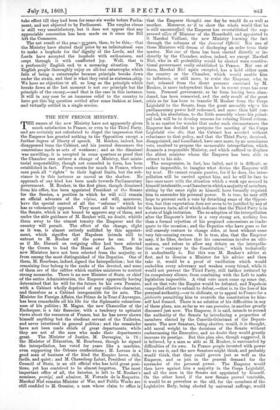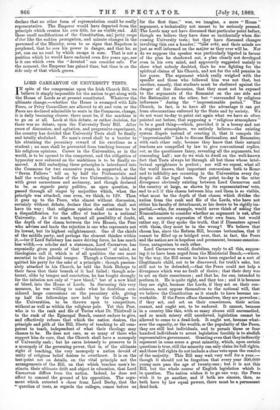THE NEW FRENCH MINISTRY.
THE names of the new Ministry have not apparently given much satisfaction to France, or even to the Third Party, and are certainly not calculated to dispel the impression that the Emperor has granted nothing to the Opposition except a further degree of liberty of speech. M. Rouher, indeed, has disappeared from the Cabinet, and his journal denounces the *concessions made as acts of weakness ; and as the dismissal was unwilling, it is accepted in some quarters as proof that the Chamber can enforce a change of Ministry, that minis-
terial responsibility, though not conceded in form, has been established in fact. Form counts for much in France, where men push all " rights " to their logical limits, but the sub- stance is in this instance as unreal as the shadow. No
approach of any kind has been made towards Parliamentary government. M. Bouher, in the first place, though dismissed from his office, has been appointed President of the Senate for the Session, a position in which he will still remain an official advocate of the re'gime, and will, moreover, have the special control of all the " reforms " which he has so vehemently opposed. They must all be submitted to the Senate, which is not bound to approve any of them, and ander the able guidance of M. Rouher will, no doubt, whittle them away to the utmost tenuity the Emperor and the *country will permit. The effect of the change, slight as it was, is almost entirely nullified by this appoint- ment, which signifies that Napoleon intends still to entrust to M. Rouher all the power he can. It is as if Mr. Disraeli on resigning office had been selected by the Crown to lead the House of Lords. Then the new Ministers have not been selected from the majority, or from among the most distinguished of the Deputies. One of them, M. Bourbeau, indeed, signed the Interpellation ; but the remaining four belong to the ranks of the devoted, and none *of them are of the calibre which enables ministers to control -strong monarchs. There is no new Minister of State, or chief -of the entire Administration, the Emperor apparently having determined that he will for the future be his own Premier, with a Cabinet wholly deprived of any collective character, and therefore as a Cabinet irresponsible for its acts. The Minister for Foreign Affairs, the Prince de la Tour d'Auvergne, 'has been remarkable all his life for the diplomatic colourless- ness of his politics ; M. Magma, the new Chancellor of the Exchequer, is a fair financier, with a tendency to optimist views aboat the resources of France, but he has never shown 'himself anything but the obedient servant of the Tuileries, and never interfered in general politics ; and the remainder have not been made chiefs of great departments, while they are not of the men who make their departments ,great. The Minister of Justice, M. Duvergier, is 76; the Minister of Education, M. Bourbeau, though he signed the interpellation, has voted for years like a machine, even supporting the Orleans confiscations ; M. Leroux is a good man of business of the kind the Empire loves, rich, ladle, and quiet ; and M. Chasselonp Labat, President of the Council of State, is an old official who has held great posi- %ions, yet has contrived to be almost forgotten. The most important office of all, the Interior, is left to M. Rouher's nominee, prote'ge', and admirer, M. Forcade de la Roquette. Marshal Niel remains Minister of War, and Public Works are still confided to 1. Gressier, a man whose claim to offiee is that the Emperor thought one day he would do as well as another. Moreover, as' if to show the whole world that he is still uncontrolled: the Emperor has re-established the sup- pressed caw% af Minister of the Household, and appointed to it Marshal Valliant, the new Ministry learning the fact through the columns of the Journal Officiel. Not one of these Ministers will dream of disobeying an order from their master. Not one of them has been elected directly or in- directly by the Chamber, unless, indeed, we except Marshal Niel, who in all probability would be elected were constitu- tional government really established in France. Not one of them, Marshal Niel again excepted, has a hold either upon the country or the Chamber, which would enable him to influence, or still more, to resist the Emperor, who, in fact, released from the direct pressure exercised by M. Rouher, is more independent than he in recent years has ever been. Personal government, so far from having been aban- doned, has been reasserted, ard the only result of the great crisis so far has been to transfer M. Rouher from the Corps Legislatif to the Senate, from the great assembly wi3c his parliamentary power half redeemed, and more than half con- cealed, his absolutism, to the little assembly where his princi- pal task will be to develop reasons for refusing liberal reform. It is no matter for wonder that under such circumstances the Emperor has decided to postpone the meeting of the Corps Legislatif sine die, that the Cabinet has acceded without reluctance to that policy, and that the Third Party, deceived, disappointed, and humiliated, have once more, by an unanimous vote, resolved to propose the memorable interpellation, which demands a responsible Ministry, and which sufficed to displace the ablest minister whom the Emperor has been able to attract to his side.
The compromise, in fact, has failed, and it is difficult, or rather impossible, to imagine what device the Emperor will try next. He cannot remain passive, for if he does, the inter- pellation will be carried against him, and he will be face to face once more with the situation which a week ago seemed to himself intolerable,—a Chamberin which a majority of members, sitting by the same right as himself, have formally required him to surrender his personal power. It is true, he may still hope to prevent such a vote by detaching some of the Opposi- tion, but that expectation does not seem to be justified by any of the known facts, all of which indicate that the Third Party is in a state of high irritation. The re-adoption of the interpellation after the Emperor's letter is a very strong act, nothing less than a formal rejection of his proposed concessions as inade- quate to the occasion ; and the Deputies who have gone so far will scarcely venture to change sides, at least without some very fair-seeming excuse. It is true, also, that the Emperor may, if he likes, declare that his concessions involve an ulti- matum, and refuse to allow any debate on the interpella- tion as "contrary to the Constitution," which technically it undoubtedly is. But this was M. Rouher's advice at first, and to dismiss a Minister for his advice and then take it, would be a proof of vacillation which would embolden every adversary and weaken every friend, while it would not prevent the Third Party, still farther irritated by its compulsory silence, from combining with the Left to make legislation impossible. A vital vote must come up some day, and on that vote the Empire would be defeated, and Napoleon compelled either to submit to defeat,—that is, to the loss of his personal authority,—or to abdicate, or to appeal to France for a plebiscite permitting him to override the constitution he him- self had framed. There is no solution of his difficulties in any of these plans, nor, so far as we can perceive, in another greatly discussed just now. The Emperor, it is said, intends to extend the authority of the Senate by introducing a proportion of
members elected by the Conseils-Generaux of the Depart-- meats. The new Senators, being elective, would, it is thought, add moral weight to the decisions of the Senate without embarrassing the Executive, and no doubt they would greatly increase its prestige. But this plan also, though suggested, it is believed, by a man so able as M. Rouher, is surrounded by difficulties of its own. In France people invested with power like to use it, and the new Senators might think, and probably would think, that they could govern just as well as the Emperor, and so join in the general demand for the surrender of the personal power. The Emperor would then have against him a majority in the Corps Legislatif, and all the men in the Senate not appointed by himself.
On the other hand, if the new Senate proved tractable, it would be as powerless as the old, for the members of the Legislative Body, being elected by universal suffrage, would.
declare that no other form of rePresentation could be really representative. The Emperor would 128,9p departed from the principle which creates his own title, for no nalaibler.end. All these small modifications of the Constitution, and' petty, coups d'état like the sudden prorogation, and minute changes iii the personnel of the Ministry, seem to us signs that Napoleon is perplexed, that he sees his power in danger, and that he, as yet, can see no road by which escape is sure. That is not a position which he would have endured even five years ago, nor is it one which even the " devoted " can consider safe. For the moment, the Emperor has gained time, but time is on the side only of that which grows.































 Previous page
Previous page